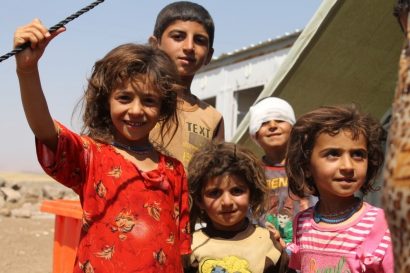 Violence, Conflict and Emergencies
Violence, Conflict and Emergencies
The world is undergoing a process of rapid urbanisation. In 1950, less than 30 per cent of the world’s population lived in cities and towns. That figure has now increased to over 50 per cent and is expected to reach 60 per cent by 2030. A growing number and proportion of the world’s refugees are also to… Read more
Although there has been progress in many areas, the overarching message to emerge from the 2011 Education for All (EFA) Global Monitoring Report is that most of the goals will be missed. Countries affected by armed conflict are among the farthest from reaching the Education for All goals, and face particularly daunting challenges. The hidden crisis in… Read more
More than 19.3 million people were displaced by disasters in 100 countries in 2014. Since 2008, an average of 26.4 million people have been displaced from their homes each year by disasters brought on by natural hazards – equivalent to one person displaced every second. The report presenting evidence on the scale, patterns and trends… Read more
This report is based on data and analysis gathered between January and December 2014 in 60 countries and territories across the world. The report’s findings reveal that the causes and impacts of displacement are multiple and often overlapping, including those related to disasters induced by natural hazards. In 2014, there were people living in internal displacement… Read more
UNRWA has been integrating human rights, conflict resolution and tolerance (HRCRT) in its schools for more than 10 years. The HRCRT policy takes the definition of human rights education that was developed for the World Programme for Human Rights Education (HRE), which began in 2005. The World Programme for HRE has provided a framework for… Read more
Teachers are at the heart of the education reforms of the United Nations Relief and Work Agency for Palestine Refugees in the Near East (UNRWA). A school based programme of continuous professional development for teachers was therefore introduced in 2012. UNRWA’s School Based Teacher Development (SBTD): Transforming Classroom Practices programme reflects the importance of developing and supporting… Read more
Students in the United Nations Relief and Works Agency for Palestine Refugees in the Near East (UNRWA) schools are taught the curriculum of their host country; an agreement which has been in place between UNRWA, UNESCO and the host countries since 1954 to facilitate refugees’ access to the host countries’ secondary schools. UNRWA need to ensure that… Read more
Quality education that builds relevant skills and knowledge enables refugees to live healthy, productive lives and builds skills for self-reliance. At present, many refugees lack access to quality education that provides physical protection and personal capacity development. This is particularly true for marginalised groups, including children and young people with physical and cognitive disabilities; overaged learners… Read more
The present Master Glossary is a revised compilation of terms commonly used in UNHCR publications and expanded to incorporate several terms from the OCHA Glossary of Humanitarian Terms. The Glossary will be a living document that will be adjusted according to contemporary developments. There is flexibility in the sense that, if deemed necessary, definitions can… Read more
In Chad, refugee students from the Central African Republic (CAR) follow the Chadian curriculum, whereas Sudanese refugees followed the Sudanese curriculum since they arrived in 2003. Due to the difference in language and educational system (Anglophone in Sudan versus Francophone in Chad), a decision was made in 2003 that Sudanese refugee children would follow the… Read more
The aim of this study was to evaluate the short-term impact of a group crisis intervention for children aged 9–15 years from five refugee camps in the Gaza Strip during ongoing conflict. Children were selected if they reported moderate to severe post-traumatic stress reactions, and were allocated to group intervention, encouraging expression of experiences and… Read more






